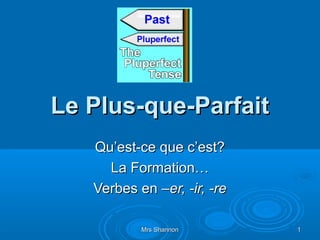
Plus que-parfait
- 1. Le Plus-que-Parfait Qu’est-ce que c’est? La Formation… Verbes en –er, -ir, -re Mrs Shannon 1
- 2. Qu’est-ce que c’est? Le plus-que-parfait is a form of the past tense It is used to express a an action that had taken place before another action in the past. Ex. Il avait mangé la pomme quand il s’est senti malade) • (He had eaten the apple when he felt sick) Like the P.C., there are two parts to the P-Q-P: A/ an auxiliary verb (avoir or être) Conjugated in the imparfait B/ a past participle Mrs Shannon 2
- 3. Auxiliary Verb Avoir Avoir = To have J’avais Tu avais Il/elle avait Nous avions Vous aviez Ils/elles avaient Mrs Shannon 3
- 4. Auxiliary Verb Etre Être = To be J’étais Tu étais Il/elle était Nous étions Vous étiez Ils/elles étaient Mrs Shannon 4
- 5. La Formation Les verbes en -er Verbes en –er: to form the past participle, drop the –er of the infinitive and add “é” Example: DONNER = Past participle: ____________________ Auxiliary verb: ____________________ Mrs Shannon 5
- 6. Donner Donner = to give Past Participle = donné Auxiliary Verb = avoir Conjugate the verb donner in the plus-que-parfait! Mrs Shannon 6
- 7. Donner J’avais donné (I had given) Tu avais donné (you had given) Il/elle avait donné (he/she had given) Nous avions donné (we had given) Vous aviez donné (you had given) Ils/elles avaient donné (they had given) Mrs Shannon 7
- 8. La Formation Les verbes en -ir Verbes en –ir: to form the past participle, drop the –ir of the infinitive and add “i” Example: FINIR = Past participle: ____________________ Auxiliary verb: ____________________ Mrs Shannon 8
- 9. Finir Finir= to finish Past Participle = fini Auxiliary Verb = avoir Conjugate the verb finir in the plus-que-parfait! Mrs Shannon 9
- 10. Finir J’avais fini (I had finished) Tu avais fini (you had finished) Il/elle avait fini (he/she had finished) Nous avions fini (we had finished) Vous aviez fini (you had finished) Ils/elles avaient fini (they had finished) Mrs Shannon 10
- 11. La Formation Les verbes en -re Verbes en –re: to form the past participle, drop the –re of the infinitive and add “u” Example: Rendre = Past participle: ____________________ Auxiliary verb: ____________________ Mrs Shannon 11
- 12. Rendre Rendre = to give back Past Participle = rendu Auxiliary Verb = avoir Conjugate the verb rendre in the plus-que-parfait! Mrs Shannon 12
- 13. Rendre J’avais rendu (I had given back) Tu avais rendu (you had given back) Il/elle avait rendu (he/she had given back) Nous avions rendu (we had given back) Vous aviez rendu (you had given back) Ils/elles avaient rendu (they had given back) Mrs Shannon 13
- 14. Devoirs Conjugez les verbes suivants au plus-que- parfait: Fermer = ____________ Parler = ____________ Devenir = ____________ Dormir = ____________ Battre = ____________ Vendre = ____________ Mrs Shannon 14
- 15. L’accord du Participe Passé N’oubliez pas les régles de l’accord! It agrees with the subject when conjugated with être and the direct object when it’s placed before the verb when it is conjugated with avoir. Mrs Shannon 15
- 16. Complete the following: Elle ________________ (arriver) Elle ____________ (venir) très tôt. La cathédrale que je _________(visiter) Les pommes que nous _________ (manger) Ils __________ (descendre) à la plage. Mrs Shannon 16
